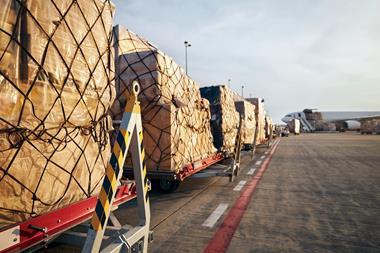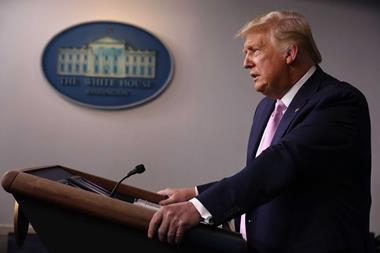
Source: Golden Shrimp/Shutterstock.com
New US tariffs of 25% on automobiles and automobile parts coming into the country will drive up costs and put “enormous pressure” on supply chains, according to supply chain consultant Scala.
Earlier this week, the Trump administration announced the automobile tariffs, which will come into effect on 2 April, while those on parts will be implemented no later than 3 May.
The US imports around 8m cars per year, while US manufacturers are reliant on parts manufactured in other countries, particularly Mexico and Canada. Around 60% of cars made in the US use imported parts, according to research from investment bank Berstein.
However, according to CNN, any parts coming from Canada and Mexico that comply with the US-Mexico-Canada Agreement (USMCA) will be exempt from the tariffs until US customs has a system in place to apply tariffs to non-US parts.
Scala executive director Chris Clowes described the new tariffs as a major escalation in trade policy, with ripple effects felt far beyond the US.
"While the aim may be to boost domestic manufacturing in the US, the reality is that automotive supply chains today are highly complex, tightly interwoven, and global," said Clowes.
"Components often cross multiple borders before a vehicle reaches final assembly, so sudden tariffs like this may drive up costs - not just for manufacturers and suppliers, but for consumers in turn, too.
“This kind of disruption puts enormous pressure on global supply chains. Businesses will be forced to reassess sourcing strategies, redirect shipments, and renegotiate contracts - all at short notice."
Clowes said that smaller suppliers could well be hit the hardest as margin pressures mount and access to key markets becomes uncertain.
However, larger manufacturers would also face challenges as production cannot be easily and cheaply relocated.
Moving production also has knock-on effects like plant shutdowns and longer lead times.
"Ultimately, if the goal is to strengthen manufacturing, a more effective approach would be through targeted negotiations and exemptions - rather than broad tariffs that disrupt entire global networks and introduce new layers of risk for everyone involved."
According to consultancy Aevean, 116,000 tonnes of air cargo imports into the US will be affected by the tariffs based on 2024 figures. Automotive commodities included in this figure are brakes, steering wheels, drive axles, suspension systems, gearboxes, vehicle bodies and 'others'.
Germany, China and Japan are the most affected trading partners in terms of airfreight volumes, with shares of 23%, 20% and 8% respectively. Other countries that are affected are Mexico, South Korea, Italy and the UK.
Looking ahead, Clowes said firms should prepare for further supply chain disruption: "Having resilient supply chains that can adapt to sudden policy shifts like this is critical for businesses of today.
"With increasing political and economic volatility across the globe, decisions that significantly impact trade are becoming more frequent, and often with little warning. Businesses should expect further disruptions and be prepared for more reactive, fragmented policymaking in the months to come.”
The air cargo industry transports all types of automotive spare parts, everything from windshields, engines, tyres, shafts, gearboxes, seats, windshields, electronics and spare parts for production sites, right up to entire cars.


















